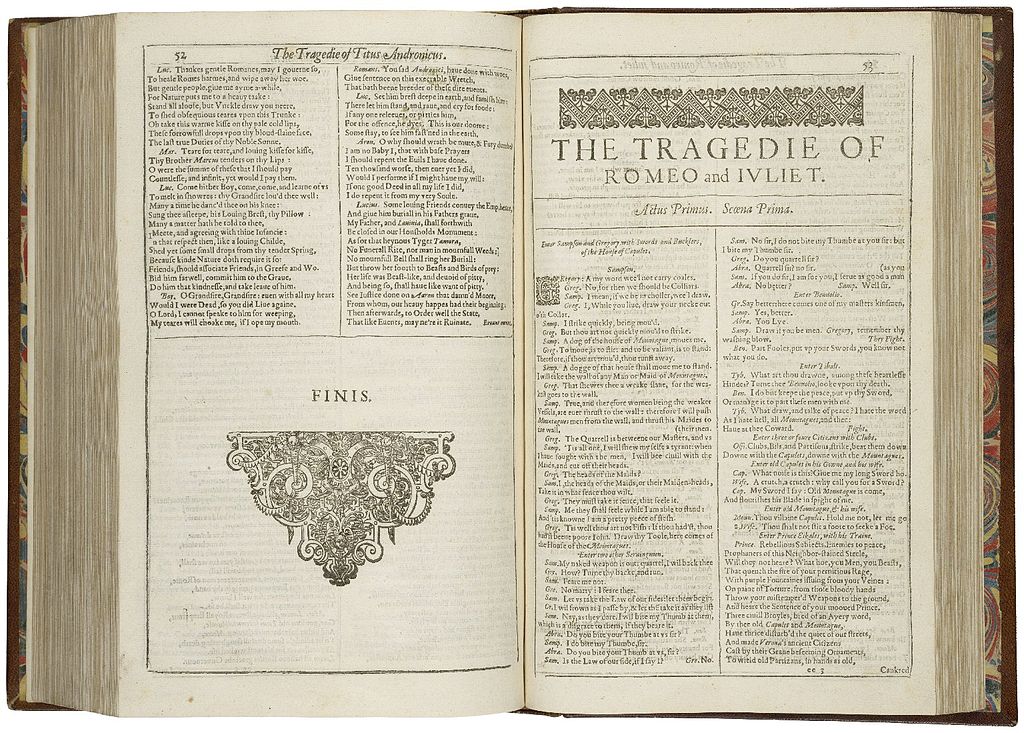
Act V continued
Scene 3
At this point, it’s a popular idea to assign parts and select students to act the final tragic scene as they read their lines. Switch the tape off, and clear desks from the front of the classroom. Students actors wear minimal costumes such as a long brown tunic for the Friar in addition to cloaks and plastic swords. A complication opens the scene: Count Paris arrives to place flowers on Juliet’s grave, which is usually placed center stage with Tybalt’s corpse nearby. Most of the main characters converge at the Capulets’ vault in addition to the supposedly dead Juliet. When Romeo arrives, the grieving husband must have a reason to be alone, so he tells his servant he wishes to remove a ring from Juliet’s finger as a memento. Horrified at Romeo’s sacrilegious attempt to open Juliet’s tomb, the Count recognizes Romeo as Tybalt’s murderer and attempts to arrest him.
Why does Shakespeare alllow Romeo to kill again? Romeo’s words convey his longing to be alone with Juliet, and the other man’s unwelcome presence incites him to commit another desperate act. After stabbing him, Romeo realizes it is Paris he has killed and is confused at the Count’s talk of Juliet, although he vaguely remembers Balthasar talking of a marriage between Juliet and Paris. He places the corpse in Juliet’s tomb. Then he sees Juliet lying there still so beautiful. Romeo is distraught with grief, but we wish he had realized that Juliet is still living. His speech is poignant, a good choice for boys to memorize.
Two more coincidences occur: Friar Laurence arrives seconds after Romeo’s death, too late to tell Romeo that Juliet is not dead, and the Count’s servant arrives immediately after Juliet stabs herself. Both lovers’ deaths occur moments after someone could possibly have prevented their suicides. Students have strong opinions about the Friar’s haste to get away, with or without Juliet. They realize he panics and wants to avoid being implicated in the lovers’ deaths and find his action contemptible. It is obviously cowardly to leave Juliet to her certain fate.
Shakespeare now brings on stage all the main characters except Romeo’s mother who has died of grief at her son’s exile and the Nurse whose annoying presence would detract from the tragedy. Students wonder why Shakespeare includes the Friar’s long, unnecessary explanation that begins, “I will be brief”! The audience has followed the antecedent events, but perhaps Shakespeare wants us to witness the parents’ reactions to their children’s tragic deaths. The Prince magnanimously admits he shares culpability and should have ended the two families’ hostility earlier.
Inevitably, we think of the irresponsible Friar and Nurse and the Capulets’ abandonment of their daughter. How tragic it is that Romeo and Juliet are “sacrifices of [their parents’] enmity.” The fathers’ promises of permanent memorials are magnanimous, and we are thankful the long feud is over, but at what a cost. In this final scene and indeed throughout the play, Shakespeare’s focus is the tragic result of long-standing hatred. The Montagues and Capulets have lost their most precious possessions, their children. Romeo and Juliet had to keep their love and subsequent marriage secret because of their parents’ hatred for one another. This need for secrecy led to their deaths. As the highest-ranking character, the Prince delivers the closing lines.
The major issues in Act V are these:
-
- examples of dramatic irony
- coincidences
- climax
- tragic resolution
How to Teach Literatuare: Introductory Course includes various teaching aids such as essay topics, a plot diagram, review questions, and tests.
About the Author
Written by Elizabeth McCallum Marlow
I taught all aspects of the English curriculum at various colleges and private schools for 35 years. I now want to give back what I learned in the classroom about conveying to students a love for literature and a desire to write cogently. I would love to receive comments and questions that can be addressed to me at www.eamarlow0103@gmail.com.

